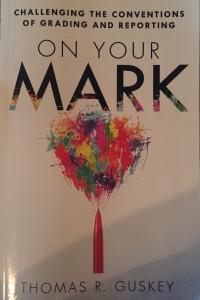The district I serve in moved to “standards-based report cards” a few years before I arrived in 2007 and I can honestly say they have created heartburn and lively debate three times each year. These have been revised and re-aligned as standards have changed and teachers have had a great voice in the process, but confusion still remains in many pockets (including among parents that reports cards are designed for) on how these work. It took me about five years to realize that the report cards are not the problem as much as our lacking knowledge and agreement about grading practices across many grades.
This confusion led me to order Thomas Guskey’s book, On Your Mark, the day I saw it advertised in Ed Week because I have read his editorials about grading practices and he makes a lot of sense when talking about grading practices and the historically absurd things we include in “a grade” from PreK-College, such as attendance, not using bathroom passes, using 0’s rather than incompletes, etc. While some may argue that these things are legit because that’s the way it’s been and kids should get used to “real life”, Guskey provides thought-provoking argument around purpose leading to process in grading, something that often is lost as educational institutions seek efficiency and mass compliance.
Guskey frames this book around three critical steps for approaching grading:
1.) Clarify the purpose of grading and reporting.
2.) Align all classroom and school policies and practices with the stated purpose.
3.) Ensure proposed changes are supported by strong research evidence.
These steps are clearly not a how-to for improving grading and allow the natural leadership and collaboration that must happen within the context of a school or district, but they clearly state the parameters for reaching sound grading practices. While much of the book has an activist tone, it is from Guskey’s conviction that this topic IS important enough for us all to question, rethink, and improve if we as educators are truly about learning and not schooling. Amid the passionate voice is sound evidence from history, research, and personal experience of this esteemed educator. Each chapter presents concepts worth challenging, the reasons they exist, and their flaws in practice. Some are painfully familiar, my favorite being to “Challenge the Bell Curve”, which elicited much conversation with friends who are far more statistically minded than me!
While the book won’t walk you through revising your school or district’s grading culture, it will stem the conversations and thinking about practices and personal beliefs that can begin that process. These are conversations that should happen soon in many institutions, so I give this book 4 SutterStars and recommend it to teachers K-16!

